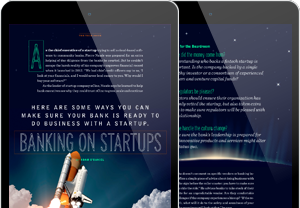
Banking on Startups
As the chief executive of a startup trying to sell a cloud-based software to community banks, Pierre Naude was prepared for an extra helping of due diligence from the banks he courted. But he couldn’t escape the harsh reality of his company’s unproven financial record when it launched in 2012. “We had chief credit officers say to us, ‘I look at your financials, and I would never lend money to you. Why would I buy your software?’”
As the leader of startup company nCino, Naude says he learned to help bank executives see why they could trust nCino to grow, scale and continue to serve its customers reliably over the long term. “I learned that before I sent over our financials to have a 15 or 20 minute conversation so I could show them the quality of my investors and employees,” Naude says.
The strategy paid off. nCino, a 2012 spin-out from Wilmington, North Carolina-based Live Oak Bank, has doubled its client list or more every year since it launched and now lists large institutions such as SunTrust Banks and Bank of the West among its customers. The company, also based in Wilmington, offers a cloud-based commercial lending software that allows bankers to access a customer’s entire banking relationship anywhere, anytime, from a tablet computer.
Fintech companies are raising billions of dollars to transform the financial services market. Many seek to grab business once dominated by traditional banks. Others, such as nCino, aim to partner with lenders to power growth.
As experts in measuring risk, bankers tend to avoid new players altogether. But as disruption and innovation continue to influence discussion among bank directors and senior leadership teams, understanding how to engage and vet startups with new products and services is crucial. “Should a community bank avoid all startups? No. If they have a product or service that can help you, they can be a great partner,” says Paul Schaus, president of bank consulting firm CCG Catalyst. “Just because they’re small doesn’t mean they’re bad. It just means you need a different risk assessment process.”
Be sure, assessing and deciding how to engage a startup is as varied as every loan decision. Still, bankers, entrepreneurs and industry leaders agree there are a handful of common sense steps boards and management teams should take to determine if they’ve found a solid match.
“Part of our shopping mentality is to look at startups, because we believe that can give us a competitive edge in our market,” says Nick Zotti, vice president of information systems at TheBANK of Edwardsville, a $1.6 billion asset lender outside of St. Louis. “The tried and true vendors are exactly that, tried and true. But they don’t always provide the innovation.”
Zotti led a project committee that made a recommendation to the lender’s board of directors to hire nCino as the bank’s new core commercial lending system. He acknowledges initial hesitation to deal with a young, unproven firm.
“Our board had questions. There was a lot of dialogue to make sure this was the right relationship,” he says. “We put them under more scrutiny than our typical vendors.” The bank sent a team of bankers to nCino’s headquarters to investigate. They got to know the company’s leaders, and learned about their deep ties to banking and strong capital base from investors, such as retired Morgan Stanley chairman and CEO John Mack, who also understood the industry. Zotti says finding a startup with bank knowledge in its DNA made the difference. “The fact that they spun-off from a bank, with former bankers as employees and investors, that helped sell us on the solution,” he says.
Zotti’s advice to peers? “Don’t move too fast. Understand the leadership, their culture and their financial backing.” Of course, banking and financial expertise isn’t the end-all criteria. Lenders should make sure to structure contracts with startup vendors in accordance with all regulatory guidance, experts say. Even a well-heeled startup with great leaders can be volatile. Small steps such as asking for shorter contracts or extra cash to be held in escrow in case of a financial difficulty are often wise. “There’s nothing wrong with doing business with a new company that formed in 2014 with $3 million in equity capital and has a great app. It’s OK for the bank to go into that deal. Just do your homework,” Schaus says.
Cary Whaley, vice president of payments and technology policy for the Independent Community Bankers of America, recommends banks engage their external legal counsel and auditors early in the vetting process to ensure every regulatory box has been checked. Banks that choose an established, tried-and-true vendor tend to receive less scrutiny than those that opt for an unproven startup. “Financials, background, due diligence and communications will all be reviewed,” Whaley says. “Even if it’s the next Steve Jobs, a vendor working out of his garage isn’t going to pass muster. Risk must be accounted for and insured. You’ve got to show you’re aware of the risk and have taken steps to mitigate it.”
Earlier this year, a rising-star fintech startup in Texas gave its bank customers pause when its founder and CEO resigned abruptly. Sean Pennock, an executive with 20 years of financial services experience, left payments processor Aptys Solutions in January, according to the company. Since then, he has been sued for breach of fiduciary duty and accused of filing false financial statements and concealing $1.6 million in unpaid payroll taxes. Aptys has moved on with a new management team, and Pennock’s attorneys did not respond to a request for comment. Pennock denies all the allegations in the lawsuit, according to court documents. The suit was pending as of the end of October.
Still, the episode offered a sober reminder to banks that startups can be volatile. Whaley, who doesn’t comment on specific vendors or banking institutions, says he offers a simple piece of advice about doing business with a startup: “It’s like the sign before the roller coaster; you have to make sure you’re tall enough to ride the ride.” He advises banks to take stock of their own internal appetite for an unpredictable vendor. Are they comfortable coping with the challenges if the company experiences a hiccup? “If the relationship goes south, what will it do to the safety and soundness of your bank? I guarantee the examiners will look at that,” he says.
Stephen Bohanon, founder of startup Alkami, which provides online and mobile banking services to banks, advises banks dealing with a startup to ask for more in contracts than they normally receive from Fortune 1000 vendors. His company, founded in 2009, has about 2 million users on or under contract for its platform. “For example, it’s hard to ask for a five-year contract when you can’t show that you have enough cash to last past next spring,” he says.
There’s also upside to consider. Zotti, at TheBANK of Edwardsville, says his greatest fear when contracting with a startup is what happens as they continue to grow and scale. “I want to know how long they’ll be independent and who will acquire them,” he says. “When and if that happens, how will it affect our relationship?”
At nCino, Naude says beyond a solid financial foundation, he believes most questions and concerns related to startups should focus on company culture. He says “reputation and innovation” have been the pillars of nCino’s culture since its inception. Further, he says banks should consider how their own internal culture may change when partnering with an innovative startup. “I make sure our clients understand working with us is a business project, not an IT project, and that they need to provide the leadership for a culture change,” he says. “The culture change is a big step for most banks.”

Join OUr Community
Bank Director’s annual Bank Services Membership Program combines Bank Director’s extensive online library of director training materials, conferences, our quarterly publication, and access to FinXTech Connect.
Become a Member
Our commitment to those leaders who believe a strong board makes a strong bank never wavers.


